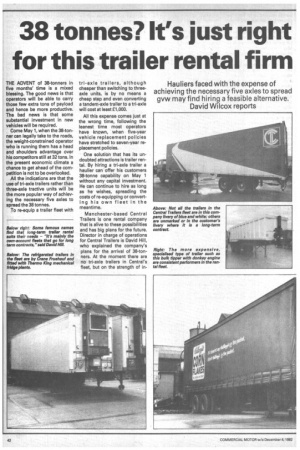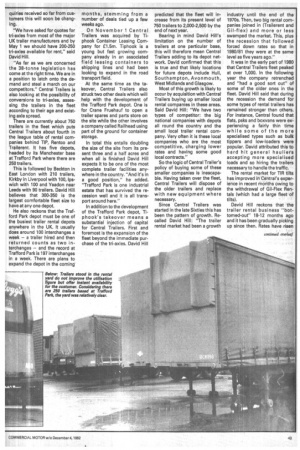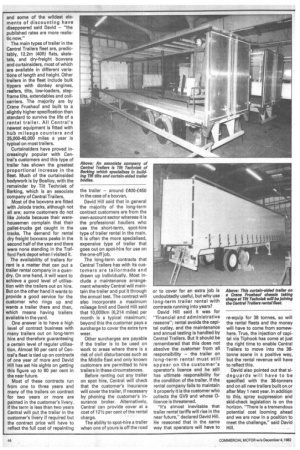38 tonnes? It's just right for this trailer rental firm
Page 32

Page 33

Page 34

If you've noticed an error in this article please click here to report it so we can fix it.
Hauliers faced with the expense of achieving the necessary five axles to spread gvw may find hiring a feasible alternative. David Wilcox reports
THE ADVENT of 38-tonners in five months' time is a mixed blessing. The good news is that operators will be able to carry those few extra tons of payload and hence be more productive. The bad news is that some substantial investment in new vehicles will be required.
Come May 1, when the 38-tonner can legally take to the roads, the weight-constrained operator who is running them has a head and shoulders advantage over his competitors still at 32 tons. In the present economic climate a chance to get ahead of the competition is not to be overlooked.
All the indications are that the use of tri-axle trailers rather than three-axle tractive units will be the more popular way of achieving the necessary five axles to spread the 38 tonnes.
To re-equip a trailer fleet with tri-axle trailers, although cheaper than switching to threeaxle units, is by no means a cheap step and even converting a tandem-axle trailer to a tri-axle will cost at least £1,000.
All this expense comes just at the wrong time, following the leanest time most operators have known, when five-year vehicle replacement policies have stretched to seven-year replacement policies.
One solution that has its undoubted attractions is trailer rental. By hiring a tri-axle trailer a haulier can offer his customers 38-tonne capability on May 1 without any capital investment. He can continue to hire as long as he wishes, spreading the costs of re-equipping or converting his own fleet in the meantime.
Manchester-based Central Trailers is one rental company that is alive to these possibilities and has big plans for the future. Director in charge of operations for Central Trailers is David Hill, who explained the company's plans for the arrival of 38-tonners. At the moment there are no tri-axle trailers in Central's fleet, but on the strength of in quiries received so far from customers this will soon be changing.
"We have asked for quotes for tri-axles from most of the major UK trailer manufacturers and by May 1 we should have 200-250 tri-axles available for rent," said David Hill.
"As far as we are concerned the 38-tonne legislation has come at the right time. We are in a position to latch onto the demand and steal a march on our competitors." Central Trailers is also looking at the possibility of conversions to tri-axles, assessing the trailers in the fleet according to their age and existing axle spread.
There are currently about 750 trailers in the fleet which puts Central Trailers about fourth in the league table of rental companies behind TIP, Rentco and Trailerent. It has five depots, headed by its Manchester base at Trafford Park where there are 250 trailers.
This is followed by Beckton in East London with 210 trailers, Kirkby in Liverpool with 100, Ipswich with 100 and Yeadon near Leeds with 90 trailers. David Hill believes that 300-350 is the largest comfortable fleet size to have at any one depot.
He also reckons that the Trafford Park depot must be one of the busiest trailer rental depots anywhere in the UK. It usually does around 100 interchanges a week — a trailer hired and then returned counts as two interchanges — and the record at Trafford Park is 197 interchanges in a week. There are plans to expand the depot in the coming months, stemming from a number of deals tied up a few weeks ago.
On November 1 Central Trailers was acquired by Tiphook Container Leasing Company for £15m. Tiphook is a young but fast growing company already in an associated field leasing containers to shipping lines and had been looking to expand in the road transport field.
At the same time as the takeover, Central Trailers also struck two other deals which will help with the development of the Trafford Park depot. One is for Crane Fruehauf to open a trailer spares and parts store on the site while the other involves a company called Railhead using part of the ground for container storage.
In total this entails doubling the size of the site from its present three and a half acres and when all is finished David Hill expects it to be one of the most complete trailer facilities anywhere in the country. "And it's in a good position," he added. "Trafford Park is one industrial estate that has survived the recession well and it is all transport around here."
In addition to the development of the Trafford Park depot, Tiphook's takeover means a substantial injection of capital for Central Trailers. First and foremost is the expansion of the fleet beyond the immediate purchase of the tri-axles. David Hill predicted that the fleet will increase from its present level of 750 trailers to 2,000-2,500 by the end of next year.
Bearing in mind David Hill's limitation on the number of trailers at one particular base, this will therefore mean Central Trailers adding to its depot network. David confirmed that this is true and that likely locations for future depots include Hull, Southampton, Avonmouth, West Midlands and Glasgow.
Most of this growth is likely to occur by acquisition with Central Trailers buying up smaller local rental companies in these areas. Said David Hill: "We have two types of competitor: the big national companies with depots all round the country and the small local trailer rental company. Very oftenit is these local companies who are the most competitive, charging lower rates and having some good local contracts."
So the logic of Central Trailer's policy of buying some of these smaller companies is inescapable. Having taken over the fleet, Central Trailers will dispose of the older trailers and replace with new equipment where necessary.
Since Central Trailers was started in the late Sixties this has been the pattern of growth. Recalled David Hill: "The trailer rental market had been a growth industry until the end of the 1970s. Then, two big rental companies joined in (Trailerent and Gil-flex) and more or less swamped the market. This, plus the recession that followed forced down rates so that in 1980/81 they were at the same level as five years ago."
It was in the early part of 1980 that Central Trailers fleet peaked at over 1,000. In the following year the company retrenched and "had a good sort out" of some of the older ones in the fleet. David Hill said that during the recession the demand for some types of rental trailers has remained stronger than others. For instance, Central found that flats, psks and boxvans were experiencing a fairly thin time while some of the more specialised types such as bulk tippers and low-loaders were popular. David attributed this to hard hit general hauliers accepting more specialised loads and so hiring the trailers necessary to handle the traffic.
The rental market for TIR tilts has improved in Central's experience in recent months owing to the withdrawal of Gil-Flex Rentals (which had a large fleet of tilts).
David Hill reckons that the trailer rental business "bottomed-out" 18-12 months ago and it has been gradually picking up since then. Rates have risen and some of the wildest elements of discounting have disappeared said David — "the published rates are more realistic now."
The main types of trailer in the Central Trailers fleet are, predictably, 12.2m (40ft) flats, skeletals, and dry-freight boxvans and curtainsiders, most of which are available in different variations of length and height. Other trailers in the fleet include bulk tippers with donkey engines, reefers, tilts, low-loaders, stepframe tilts, extendables and coilcarriers. The majority are by Crane Fruehauf and built to a slightly higher specification than standard to survive the life of a rental trailer. All Central's newest equipment is fitted with hub mileage counters and 25,000-40,000 miles a year is typical on most trailers.
Curtainsiders have proved increasingly popular with Central's customers and this type of trailer has shown the greatest proportional increase in the fleet. Much of the curtainsided bodywork is by Boalloy, with the remainder by Tilt Techniek of Barking, which is an associate company of Central Trailers.
Most of the boxvans are fitted with Joloda tracks, although not all are; some customers do not like Joloda because their warehousemen complain that their pallet-trucks get caught in the tracks. The demand for rental dry freight boxvans peaks in the second half of the year and there were none standing in the Trafford Park depot when I visited it.
The availability of trailers for rent is a matter that can put a trailer rental company in a quandry. On one hand, it will want to achieve a good level of utilisa tion with the trailers out on hire. But on the other hand it wants to provide a good service for the customer who rings up and wants a trailer there and then, which means having trailers available in the yard.
One answer is to have a high level of contract business with many trailers out on long-term hire and therefore guaranteeing a certain level of regular utilisation. Almost 50 per cent of Central's fleet is tied up on contracts of one year of more and David Hill has set his sights on getting this figure up to 60 per cent in the near future.
Most of these contracts run from one to three years and many of the trailers on contract for two years or more are painted in the customer's livery. If the term is less than two years Central will put the trailer in the customer's livery if required but the contract price will have to reflect the full cost of repainting the trailer — around E400-£450 in the case of a boxvan.
David Hill said that in general the majority of the long-term contract customers are from the own-account sector whereas it is the professional hauliers who use the short-term, spot-hire type of trailer rental in the main. It is often the more specialised, expensive type of trailer that goes out on spot-hire for use on the one-off job.
The long-term contracts that Central Trailers has with its customers are tailormade and drawn up individually. Most include a maintenance arrangement whereby Central will maintain the trailer and put it through the annual test. The contract will also incorporate a maximum mileage limit and David Hill said that 10,000km (6,214 miles) per month is a typical maximum; beyond this the customer pays a surcharge to cover the extra tyre wear.
Other surcharges are payable if the trailer is to be used on work to areas where there is a risk of civil disturbances such as the Middle East and only known customers are permitted to hire trailers in these circumstances.
Before renting out any trailer on spot hire, Central will check that the customer's insurance will cover the trailer, if necessary by phoning the customer's insurance broker. Alternatively, Central can provide cover at a cost of 121/2 per cent of the rental charge.
The ability to spot-hire a trailer when one of yours is off the road or to cover for an extra job is undoubtedly useful, but why use long-term trailer rental with contracts running into years?
David Hill said it was for "financial and administrative reasons"; rental avoids the capital outlay, and the maintenance and annual testing is handled by Central Trailers. But it should be remembered that this does not absolve the customer from all responsibility — the trailer on long-term rental must still appear on the customer's operator's licence and he still has ultimate responsibility for the condition of the trailer. If the rental company fails to maintain it properly it is the customer who collects the GV9 and whose 0licence is threatened.
"It's almost inevitable that trailer rental tariffs will rise in the near future," declared David Hill. He reasoned that in the same way that operators will have to re-equip for 38 tonnes, so will the rental fleets and the money will have to come from somewhere. True, the injection of capital via Tiphook has come at just the right time to enable Central Trailers to move into the 38tonne scene in a positive way, but the rental revenue will have to reflect this.
David also pointed out that sideguards will have to be specified with the 38-tonners and on all new trailers built on or after May 1 next year. In addition to this, spray suppression and skid-check legislation is on the horizon. "There is a tremendous potential cost looming ahead and we are now in a position to meet the challenge," said David Hill.














































